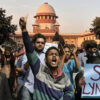In a significant development, the Supreme Court has directed states to submit detailed affidavits regarding steps taken to address mob lynching incidents, emphasizing the need for compliance with established guidelines. The court’s directive came in response to a public interest litigation (PIL) filed by the National Federation of Indian Women (NFIW) concerning the rise in mob lynching cases across the country.
While hearing the PIL, the bench comprising Justices BR Gavai, Aravind Kumar, and Sandeep Mehta noted the absence of responses from several states and granted them six weeks to file their counter affidavits. The court stressed the importance of states’ accountability in addressing mob lynching incidents and ensuring adherence to established legal standards.
Advocate Nizam Pasha, representing NFIW, highlighted concerns over the mischaracterization of mob violence incidents as ordinary accidents or fights, contrary to the guidelines laid down by the Supreme Court in the Tehseen Poonawalla case. Pasha underscored the need for states to align their actions with the directives outlined in the Poonawalla judgment to prevent further instances of mob lynching.
During the proceedings, the court scrutinized the affidavits submitted by the states of Madhya Pradesh and Haryana, pointing out discrepancies between media reports and police narratives regarding mob lynching incidents. The court expressed dissatisfaction over the lack of FIR registration against perpetrators and emphasized the need for prompt action in such cases.
In response to the court’s queries, state counsels provided explanations regarding the FIR registration process and highlighted challenges in enforcing legal provisions related to mob lynching. However, the court reiterated the importance of strict adherence to legal guidelines and emphasized the need for impartiality in addressing such cases.
Additionally, the court addressed concerns raised by Senior Advocate Archana Pathak Dave regarding the alleged religious bias in the petition, emphasizing the need to approach the issue holistically without focusing on caste or religion. Justice Sandeep Mehta underscored the importance of impartiality and urged stakeholders to prioritize the pursuit of justice irrespective of religious or caste affiliations.
As the proceedings continue, stakeholders await the submission of detailed affidavits by states and anticipate further deliberations on the issue of mob lynching. The Supreme Court’s intervention underscores its commitment to upholding the rule of law and ensuring justice for victims of mob violence.
The matter remains listed for further hearing post the Supreme Court’s Summer Vacation, signaling ongoing scrutiny of the issue and potential future actions by the court.
Case Title: National Federation of Indian Women v. Union of India & Ors. | Writ Petition (Civil) No. 719 of 2023






















